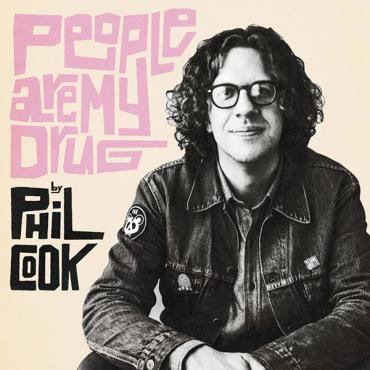Phil Cook Shows the Joys of Negative Space

Living in New York City, I’m aware space is a valuable commodity. Singer/songwriter Phil Cook, based in Durham, North Carolina, a much more spacious city, is also aware of its importance, as he demonstrates on People Are My Drug, his beautifully spacious second solo album.
Cook comes from a the folk/folk rock scene, a member of the band Megafaun and a part of the Hiss Golden Messenger repertory company, touring and recording with the band. But on People Are My Drug, Cook keeps things as stripped down as possible, relying on spartan arrangements and his sad, country-flavored voice, to shape lovely gospel-infused songs. For example, “Tide of Life,” a gospel number, is driven by a drumbeat as weak as an old man on life support. It’s barely there. But somehow it holds together the song, along with rickety piano and beautiful, female background vocals. A tasteful slide solo comes out of nowhere to reset the song but the haunting number is pretty much held together with the musical equivalent of duct tape. And not only does it hold, it makes for a beautiful song.
Cook’s gospel numbers are all beautiful. On “He Gives Us All His Love,” the piano is stronger, but the drumbeat is just as faint. Cook’s electric guitar gives more shape to the song, and he uses more gorgeous background vocals that lend the song a grandeur, like a Sunday morning spent in front of a church choir. On “Another Mother’s Son,” it’s just Cook and his electric guitar, the guitar mixed so quietly, you’re not even sure you’re hearing it. It’s quiet and powerful but the song gets faster, with instruments gradually joining the song until it turns into hand-clapping, robe-rattling, full-throttled gospel number. It’s one of the more produced tracks on the album, but even with everything it has going on, the song breathes. You can hear the mandolin. You can hear the cymbal hits. And most importantly, you can hear Cook’s sincerity.
Artists talk about negative space–the space in images where there is no image. But negative space is just as important in music. Cook, who co-produced the album with his older brother Brad, has a wonderful ear for negative musical space. He’s not afraid to let a song lean on shaky drums. He’s not afraid to let a track rely on just voice and piano. All of these choices make it possible to hear not just the essence of his songs, but also the essence of the few instruments that are lucky enough to make it onto the track. And rather than making the album feel empty, it actually gives it a huge sound; one that’s somehow cavernous and intimate. It’s the perfect amount of space.



